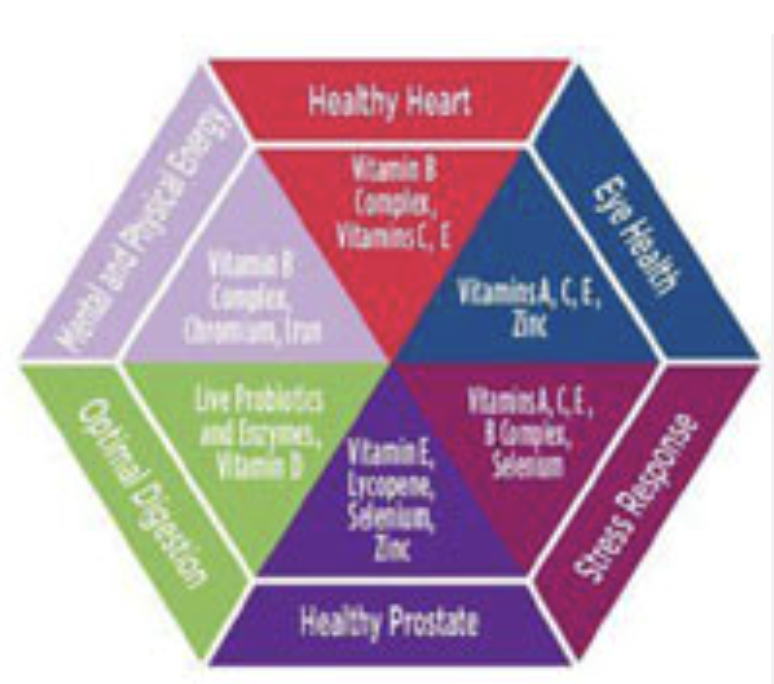Healthy and vibrant lives can be achieved through bringing hormones and nutrients back into healthy balance.
“Restoring optimal function to your cells and organs so that they do what they are suppose to do” – Professor Carl Sagan, Cornell University
Hormone imbalances cause symptoms and disease….
- Energy
- Sleep
- Weight gain
- Sex drive
- Anxiety/
- Depression
- Cholesterol/ Diabetes
- Bowel disease
- Memory
- Arthritis/Osteoporosis
- Psoriasis
- Cardiac dysfunction
As healthcare practitioners we need to look for Look for optimal levels not “Normal” * (REF)
Mental and physical stress deplete the body’s reserves: nutrients & hormones and additionally Every year our organs produce less hormones
↓Thyroid ↑ Estrone E1
↓ Testosterone ↓ DHEA
↓ melatonin
↓ Progesterone
↓ GH ↑ Insulin
↓ Estradiol E2
↓ Estriol E3 ↓Cortisol
| So no wonder Hormone deficiencies contribute to SYMPTOMS | DISEASES |
| Hot flashes | Osteoporosis |
| Vaginal atrophy | Colon cancer |
| Urinary incontinence | Heart disease |
| Sexual dysfunction | Cognitive decline |
| Sleep disturbance | Alzheimer’s |
| Decreased well being | Stroke |
| Depression/ mood swing | Tooth loss |
| Skin atrophy | Macular degeneration |
| / stamina decline | |
BIO-Identical hormones
BIO-IDENTICAL HORMONE THERAPY
– FOR WOME
ESTROGENS
– There are three groups of related hormones, each with a unique profile of activity: Estriol (60-80%), Estrodial (10-20%) and Estrone (10-20%).
– The balance shifts in menopause
– Often prescribed in combination to re-establish normal physiological balance. The use of one of more of these hormones is referred to as Estrogen Replacement Therapy (ERT).
| And in men SYMPTOMS | DISEASES | |
| Loss sexual desire | Heart disease | |
| Erectile dysfunction | Osteoporosis | |
| Anxiety | Diabetes | |
| Depression | Cognitive decline | |
| Loss motivation | Alzheimer’s | |
| Loss confidence | Stroke | |
| Muscle loss/fat gain | Tooth loss | |
| Brain fog/ loss focus Stamina decline | Macular degeneration | |

NUTRIENTS
Measure of Hormone is only 1/3 of the picture – Humans need Nutrients
Nutrient deficiencies prevent action of hormones
•Zinc is an essential part of the Estradiol, testosterone and growth hormone receptor
•Cobalt is necessary for E function (cyt P450)
•Chromium is needed for ovarian P production
•Boron is needed for Estrogen and testosterone
•B6 is needed for clearing E2 from receptor
•Methyl donors (MSM, folic acid, DMG ) needed for E1 metabolism
Progesterone, estrogen, thyroid dysfunction could be from hormone or nutrient deficiency, i.e. B-6, Se, Zn, Iodine- rule these out
•Iodine and selenium
–Meinhold, H., et al., “Effects of selenium and iodine deficiency on iodothyronine deiodinases in brain, thyroid and peripheral tissue,” JAMA 1992; 19:8-12.
–Gardner DF, Centor RM, Utiger RD. Effects of low dose oral iodine supplementation on thyroid function in normal men. Clin Endocrinol (Oxf). 1988 Mar;28(3):283-8
•Zinc
–Nishiyama, S., et al., “Zinc supplementation alters thyroid hormone metabolism in disabled patients with zinc deficiency,” J. Am. Coll. Nut. 1994; 13-62-7.
•Vitamins A, B2, B6, B12
–Brownstein, D., Overcoming Thyroid Disorders. West Bloomfield, MI: Medical Alternatives Press, 2002

Nutrient deficiencies cause disease & DNA Damage
Source:
Eur J Nutr. 2012 Apr;51(3):261-79. doi: 10.1007/s00394-012-0318-4. Epub 2012 Feb 24.Effects of micronutrients on DNA repair.Collins AR, Azqueta A, Langie SA.SourceDepartment of Nutrition, Institute of Basic Medical Sciences, University of Oslo, Blindern, PB 1046, 0316, Oslo, Norway. a.r.collins@medisin.uio.no
Most common deficiencies
•B-12 and folate
•Vitamin D
•Iodine
•Ferritin (in women)
•Magnesium
•Zinc


